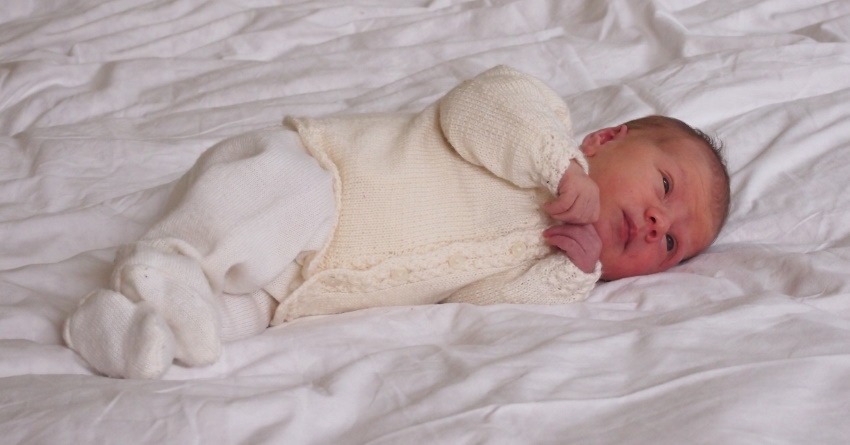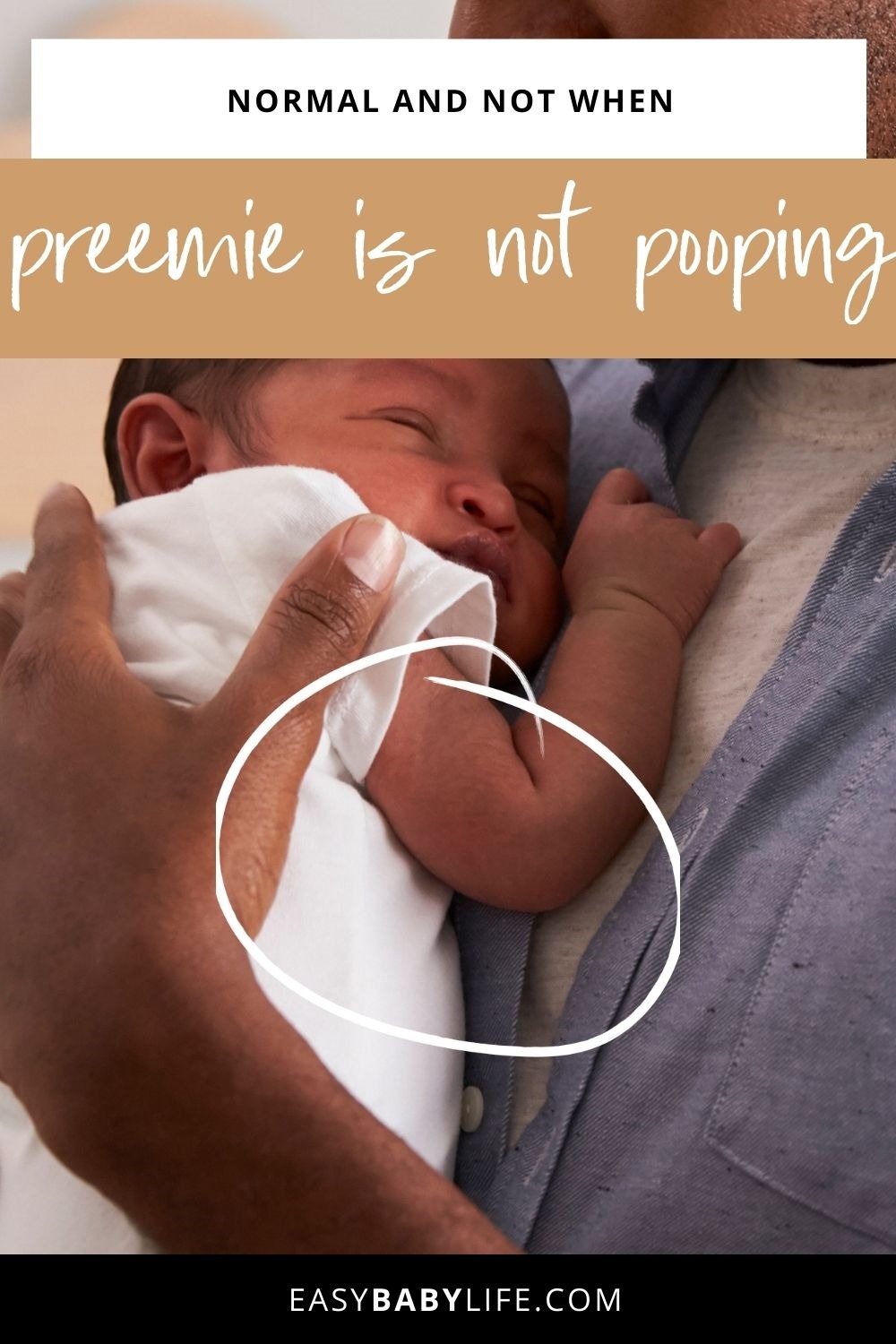Is your preemie not pooping, or maybe he or she seems to be in pain when pooping?
Let’s take a look at why pooping is often difficult for preemies and find out what you can do about it.
 Mom’s Question:
Mom’s Question:
Is it common or usual for premature babies not to poop, or that it is difficult for them to poop? I have a 3-month-old baby premature at 28 weeks. Technically 2 weeks, she is having problems pushing her poop out; she is not constipated because her stool is very loose. I’ve been helping her with a Q-tip, which seems to help. When she pushes, she gets agitated.
What else can I do so she can start going on her own again? She is on formula lactose intolerance.
Thanks in advance,
Caroline
Pooping Issues In Preemies and Newborns
When Pooping is Difficult for Preemies – Can it be Normal?
I’m actually wondering if your baby really does have problems pushing out her poop – or if what you’re seeing is just normal infant behavior.
Newborn babies (preemie or not) tend to make a lot of noise when they poop, with all sorts of grunts and straining sounds. They may even go quite red in the face. This is normal – and the fact that your baby’s stools are loose when she passes them makes it less likely that she’s experiencing anything unusual. Just make sure that their stools aren’t completely watery or very hard.
Constipation in Premature Babies
That said, it is true that preemies are more prone to constipation than full-term babies. Their intestines are still immature, to the point that movement of digested foodstuff is still uncoordinated – it takes some time before poop comes out, compared to babies who were born term.
Some types of iron supplements that may also be found in preterm formulas could cause constipation in premature babies, although more research is needed to confirm this.
Your daughter’s gastrointestinal system may not be fully mature yet, so she needs to work harder to push the poop out.
Some signs of constipation are hard, pebble-like stools or even a tiny amount of blood on the surface of the stools. You can find more signs of constipation in babies in this article. Since your daughter’s poop is loose, she is unlikely to be constipated.
Medical Reasons to Consider When Premature Babies Are Not Pooping
In addition to constipation itself, other medical reasons can cause pooping difficulties. We’ll briefly discuss some of the most common conditions, but it’s important to remember that this cannot replace your doctor’s advice. If you are uncomfortable or worried at any point, it’s best to have your child seen by a doctor.
Hirschsprung’s disease
Hirschsprung’s disease is a congenital condition wherein nerve cells controlling the movement of the colon walls are missing or insufficient. The colon’s walls cannot move correctly, so stools can get stuck and build up in that area of the intestines.
Most babies with Hirschsprung’s disease cannot pass stools within the first 24 hours of life, but some infants can pass poop at first but then start to develop other symptoms. Some signs and symptoms include difficulty feeding, irregular or infrequent bowel movements that may be explosive, and a bulging tummy.
Small bowel obstruction
It’s possible that other parts of the intestines did not form properly (or did not form at all), causing stools to be blocked and making it difficult to pass them out. However, this is more commonly seen in babies who have not pooped at all yet. Affected babies may have a slowly enlarging abdomen, vomiting episodes, and difficulty feeding.
There are different conditions that cause small bowel obstruction. In duodenal atresia, a segment of the duodenum (a part of the small intestine) does not fully develop. In jejunoileal atresia, a segment of either the jejunum or the ileum (also parts of the small intestine) does not fully develop. In these cases, the poop cannot pass through and will simply build up in that area until it blocks the intestinal passageway.
The gastrointestinal tract undergoes multiple stages of development before a baby is born. In one of these stages, the developing intestinal tract slowly changes its position in the abdomen. In malrotation, this change in position does not happen or happens in the wrong direction. This makes it prone to twist on itself, blocking the passageway of stools throughout the intestinal tract. Babies who have these conditions usually have episodes of vomiting bile and bloody stools.
Anorectal malformations
Anorectal malformations are another type of congenital condition. The rectum and the anus are two structures at the end of the intestinal tract. Babies may be born with unusual structures or malformations in these areas, making it difficult for stools to pass through properly.
Anal Stenosis
In anal stenosis, the anal opening is too narrow. In this condition, a baby’s poop will usually look like soft, thin ribbons.
Anal Atresia
In anal atresia, the anus does not form at all. A baby might not be able to poop at all, but in some cases, the poop comes out instead through another anatomical malformation called a fistula. This usually forms between the intestinal wall and a genital organ (the urethra for boys and the vagina for girls).
In general, these conditions definitely make it more difficult for babies to poop. Depending on which condition is involved and how severe it is, there are different possible treatments, including surgery.
Necrotizing enterocolitis, or NEC
Another severe possible reason a preemie has difficulties pooping is a disease called Necrotizing enterocolitis, or NEC. It is the most common in babies born before week 32 and occurs when tissue in the small or large intestine is inflamed or injured. The intestines will not hold the waste, which can pass into the baby’s abdomen and make the child very sick.
Some symptoms can be constipation or diarrhea, a swollen, red, or tender belly, green vomit, and a lethargic baby.
However, your baby is NOT likely to have NEC because it seems like your preemie has already been on infant formula for some time and is already at home. NEC usually happens when a preemie transitions to oral feeding in the NICU. It’s very rare for a preemie to be sent home if there are still with feeding. It takes a few weeks of good feeding outcomes and constant weight gain before a premature baby is usually sent home.
I mention NEC because this article is found by many parents searching for information on why their premature baby is not pooping, and in some cases, NEC could be a reason.
Learn more about NEC in this video:
What to do When Preemies Have Difficulties Pooping
For Normal Newborn Straining, It is Best Not to Intervene
If your preemie can poop but strains and have difficulties, I would personally not intervene with a Q-tip, at least not on a regular basis. If she cries or seems overly distressed, then, of course, you can help her once in a while.
It takes a while for babies’ intestines to mature and for their bodies to figure out how to poop; for some babies, it takes longer than for others. A preemie obviously may take longer than a full-term baby. “Helping them”, which seems very natural to do as a parent, may very well delay the learning process.
Give Your Baby a Massage
Instead of intervening, you can try a clockwise tummy massage, starting from your baby’s right side towards the left side of the tummy.
Try Different Movements
An efficient “exercise” for your baby to help her poop is to lay her down on her back, then bend her knees towards her tummy in a cycling motion. This really helps for releasing gas and poop.
You can also try placing your baby in a squatting position during warm baths.
Take the opportunity to make eye contact and talk or sing to your daughter!
Carry in an Upright Position
Being carried either belly down on your arm or in an upright position in a baby carrier or baby sling can also help.
For Formulafed, Constipated Preemies, Assess the Formula
For formula-fed babies, it is a good idea to talk to your baby’s healthcare provider to see if the formula should be changed in any way to improve the situation.
As I have written above, premature babies often drink special high-calorie, iron-rich formulas, which some studies say can contribute to constipation. In such a case, there may be alternatives available.
For those who breastfeed and supplement with formula, increasing the share of breastmilk may help.
Babies that Appear to be Ill or Weak Need Immediate Assessment
Finally, if your baby appears to be ill – he or she is weak-looking, appears to be in pain, has a swollen belly, is feeding poorly, or has other symptoms you are uncomfortable with, no home remedies should be tried. You should contact a doctor immediately.
Takeaway
To conclude, while it is certainly possible that your baby is experiencing typical newborn straining, I do believe you should bring up the matter with your baby’s healthcare provider. You do not write anything about your baby appearing to be ill, but it is much better to bring up one “unnecessary” issue than to miss something that may need treatment.
I hope this helps,
Paula
More Babies With Pooping Difficulties
- Baby Won’t Poop By Herself
- 1 Month Baby Not Pooping Since Days
- Baby Not Pooping? Important Reasons, Remedies, When to Worry
- Baby Cries In Pain When Pooping Even When Loose Stools
References
- Volvulus and intestinal malrotation in the newborn
- Necrotizing Enterocolitis
- Human milk for the premature infant
- Iron supplementation in preterm infants: a study comparing the effect and tolerance of a Fe2+ and a nonionic FeIII compound
- Failure to Pass Meconium: Diagnosing Neonatal Intestinal Obstruction

Paula Dennholt founded Easy Baby Life in 2006 and has been a passionate parenting and pregnancy writer since then. Her parenting approach and writing are based on studies in cognitive-behavioral models and therapy for children and her experience as a mother and stepmother. Life as a parent has convinced her of how crucial it is to put relationships before rules. She strongly believes in positive parenting and a science-based approach.
Paula cooperates with a team of pediatricians who assist in reviewing and writing articles.






Hello I have same problem my baby she’s premature gave birth at 32 weeks and she’s having problems when it’s time to poop and I’m not breastfeed she’s taking formula and she’s 36 weeks old so I don’t know what to do anymore.
Hi Zama, Have you had help from your baby’s health care provider regarding which type of formula to give to your baby? Since she is premature, her digestive system is not fully developed and she may also have reduced muscle tone, which increases the risk of constipation. Some preemie formulas are high-calorie with iron – something that may also contribute to constipation.
So, please talk to your baby’s doctor to get advice on what to do!
Take care,
My baby is two months now, she’s experiencing difficulty when coming to poo. I hate seeing her like this cz now it’s three days without pooping Her stomach is getting bigger and bigger. I tried warm water still doesn’t help, also. I tried to massage her belly still nothing. Mommies out there, plz help me!
My son is 7 weeks pre and is a minute younger than his sister. He had difficulty pooping so I tried the q-tip idea, except I wet the tips with warm water, got results instantly, now he is very happy that he got to poop finally. His poop was also loose. The doctor says that most newborns will hold back a poop sometimes and that there is nothing to worry about. So no panicking new parents. :-)
Had my baby at 31 weeks she is now 36 weeks had not pooped for 3 days she is breastfed, what do I do?
Since your daughter is breastfed, her pooping frequency is completely normal! Don’t do anything. She is just digesting everything she eats and she is probably growing quickly. You can learn more about when it is normal and not for a baby not to poop here.
Good luck!
I’m experiencing the same thing with my boy. He was born at nearly 28 weeks (now technically 5 weeks old) and he strains for a really long time to poo. He is breastfed and his stools are loose but I need to lift his legs to help him. This normally helps but can still take a long time- sometimes up to an hour. I have asked nurses and they say it is normal but it breaks my heart to see him struggling so much. Any advice is much appreciated.
My 1-month-old son had the same problems when he did go it was soft/runny like any infant on formula. He is on the Similac sensitive soy.
I took him to the pediatrician’s and they told me when babies are born their bodies do everything for them until they are capable of controlling it. When he was 1 day to 3 weeks old his body would go potty on its own. But when he was a month old his little muscles in his bottom were not letting him go.
The dr. told me not to do suppositories but just stimulate around the anus to let him know he had to work those muscles or more or less to wake them up. It was like a bubble in there shutting everything off. When I did give him a suppository at the beginning it was like it was opening the door to let it come out. He was very fussy and wasn’t going for 5 days so that is why I tried the suppositories. When I found out that constipation wasn’t the problem the dr.’s more or less told me NOT to help him go let him figure it out on his own. If you continue to do it for him he will rely on you for it. He figured it out in about a week to a week and a half.
He still only goes about every 3rd day but no longer fussy. Now we are hanging in there through colic. Hopefully, it is only the 6wk colic.
To all you moms out there have a great day!
My baby was 2 months premature and she came home on Monday which she was 2 weeks and 6 days old and ever since Monday she has only opened her bowels twice and she is on formula milk, she does try and squeeze and makes herself go dark red and she lifts her legs up to her tummy as she’s tenses but it seems like she is struggling to open her bowels
Hi Nath, how is it going with your daughter? What you describe can be just normal newborn behavior or she is a little bit constipated. What type of formula is she on? And when she does poop, is it firm at all? Formula poop is typically firmer – like peanut butter – than breast milk poop, and therefore might be a bit tougher to push out. But being so young, her situation is worth double-checking with her doctor. Let me know how things go!